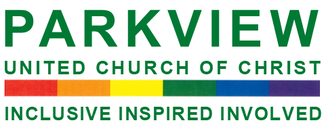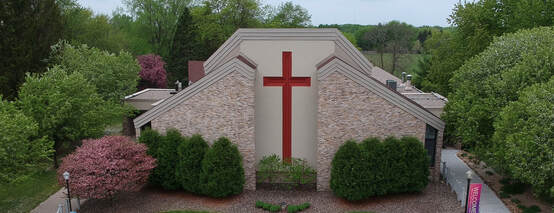WORSHIP
Basic Beliefs of the United Church of Christ
1. God is still speaking.
“Never put a period where God has put a comma.” -Gracie Allen
We believe that revelation did not stop with the closing of the canon at the Council of Trent in 1546. We believe that our faith is based on a biblical interpretation that includes new revelations and learning in science, art, music, literature, psychology and the social sciences, and other sources of knowledge that continue to evolve and change over time.
“For I am verily persuaded that the Lord hath more truth and light yet to break forth from his Holy word.” -John Robinson, pilgrim clergy on the Mayflower.
2. Church of the Extravagant Welcome.
We are a church that seeks to be an inclusive church, beginning with the practice of open communion. We value diversity and are committed to being a multiracial, multicultural church. Many of our churches are Open and Affirming, extending a welcome to gay, lesbian, bisexual and transgendered individuals. We believe that each person is a beloved child of God. “Who ever you are, wherever you are on life's journey, you are welcome here.”
3. Testimonies of faith, not tests of faith.
We are a non-doctrinal church, not requiring acceptance of a specific set of beliefs in order to be in fellowship with a congregation. We share a common statement of faith, which we understand to be guiding beliefs, with which we struggle as followers of the path of Jesus. We choose to tell each other our faith stories, and to share our struggles, believing that God is moving in each of our lives.
4. Congregational Polity and the Autonomy of the Local Church.
We believe that truth arises from the faith struggles of individuals in the context of a local church. Ours is a grass roots method of church governance with the ultimate authority for practices of faith, positions on social issues, and pastoral leadership lying in the local church. Our Conference (regional body) and General Synod (national body) offer us guidance, theological positions, and recommendations for political and social policy, which each local congregation is able to accept or reject, but is called by covenant to consider.
5. We take the Bible too seriously to take it literally.
We believe that scripture is to be continually interpreted across time, based on the always evolving scholarship in biblical criticism and the unfolding knowledge of the relationship between culture, revelation, experience, tradition, and the witness of the Scriptures.
6. The priesthood of all believers.
Paul taught that we must each work out our own faith “in fear and trembling.” Each of us is on a spiritual journey to understand the mystery we call God, and to better understand what it means to be a disciple of Jesus. The United Church of Christ is a church where your mind is nourished as well as your soul. The journey of faith is understood to be a practice in developing an open heart, a listening spirit, and a sense of mystery and awe.
7. To Believe is to Care, to Care is to Do.
In the United Church of Christ, we are a people who are engaged in continuing mission to transform the world into a place of justice and peace. We believe in the possibility of the kingdom of God on earth, and it is our responsibility to care for the suffering people of the world, through aid and development. We stand in sacred trust before God for the gift of our earth and the condition of all its inhabitants. Our faith demands action.
This is only my understanding of the theology and teaching of the United Church of Christ, and I believe that each of us as members of this church is called to consider these key understandings, so that we can articulate for ourselves and to our neighbors why this church is a unique witness and response to the challenge of following Jesus. - Reverand Deborah (Debi) Hasdorff
1. God is still speaking.
“Never put a period where God has put a comma.” -Gracie Allen
We believe that revelation did not stop with the closing of the canon at the Council of Trent in 1546. We believe that our faith is based on a biblical interpretation that includes new revelations and learning in science, art, music, literature, psychology and the social sciences, and other sources of knowledge that continue to evolve and change over time.
“For I am verily persuaded that the Lord hath more truth and light yet to break forth from his Holy word.” -John Robinson, pilgrim clergy on the Mayflower.
2. Church of the Extravagant Welcome.
We are a church that seeks to be an inclusive church, beginning with the practice of open communion. We value diversity and are committed to being a multiracial, multicultural church. Many of our churches are Open and Affirming, extending a welcome to gay, lesbian, bisexual and transgendered individuals. We believe that each person is a beloved child of God. “Who ever you are, wherever you are on life's journey, you are welcome here.”
3. Testimonies of faith, not tests of faith.
We are a non-doctrinal church, not requiring acceptance of a specific set of beliefs in order to be in fellowship with a congregation. We share a common statement of faith, which we understand to be guiding beliefs, with which we struggle as followers of the path of Jesus. We choose to tell each other our faith stories, and to share our struggles, believing that God is moving in each of our lives.
4. Congregational Polity and the Autonomy of the Local Church.
We believe that truth arises from the faith struggles of individuals in the context of a local church. Ours is a grass roots method of church governance with the ultimate authority for practices of faith, positions on social issues, and pastoral leadership lying in the local church. Our Conference (regional body) and General Synod (national body) offer us guidance, theological positions, and recommendations for political and social policy, which each local congregation is able to accept or reject, but is called by covenant to consider.
5. We take the Bible too seriously to take it literally.
We believe that scripture is to be continually interpreted across time, based on the always evolving scholarship in biblical criticism and the unfolding knowledge of the relationship between culture, revelation, experience, tradition, and the witness of the Scriptures.
6. The priesthood of all believers.
Paul taught that we must each work out our own faith “in fear and trembling.” Each of us is on a spiritual journey to understand the mystery we call God, and to better understand what it means to be a disciple of Jesus. The United Church of Christ is a church where your mind is nourished as well as your soul. The journey of faith is understood to be a practice in developing an open heart, a listening spirit, and a sense of mystery and awe.
7. To Believe is to Care, to Care is to Do.
In the United Church of Christ, we are a people who are engaged in continuing mission to transform the world into a place of justice and peace. We believe in the possibility of the kingdom of God on earth, and it is our responsibility to care for the suffering people of the world, through aid and development. We stand in sacred trust before God for the gift of our earth and the condition of all its inhabitants. Our faith demands action.
This is only my understanding of the theology and teaching of the United Church of Christ, and I believe that each of us as members of this church is called to consider these key understandings, so that we can articulate for ourselves and to our neighbors why this church is a unique witness and response to the challenge of following Jesus. - Reverand Deborah (Debi) Hasdorff

